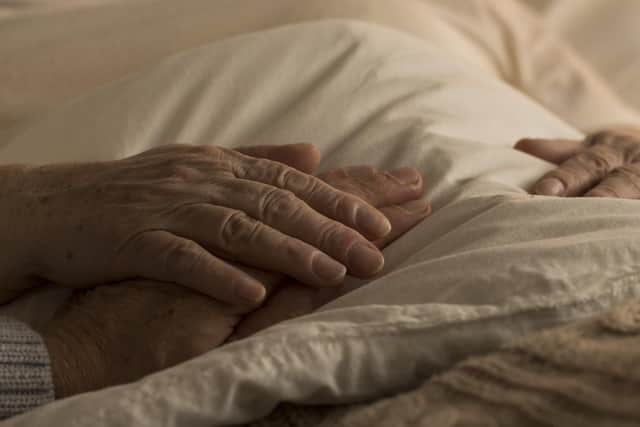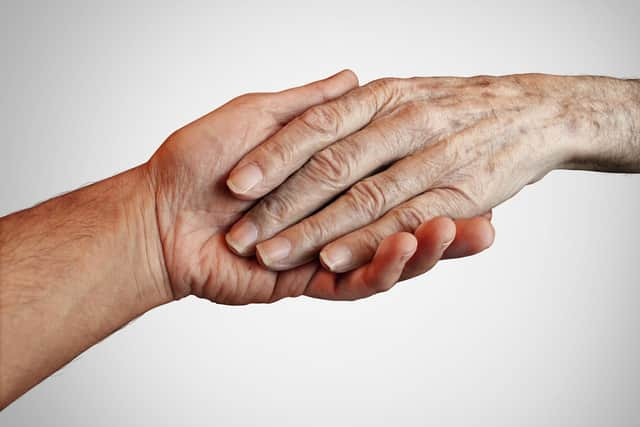Assisted dying Scotland: Michael was calling to say he had arranged to end his life - Will Slater
My mum's cousin was in hospital with pneumonia and his daughter had told us that things weren't looking good for the 95-year old.
So when the phone rang we expected to be told the news that Michael had succumbed to the infection. Instead, it was Michael on the phone, his voice still carrying the traces of his Cumbrian accent, despite his 60 or so years in Canada.
Advertisement
Hide AdAdvertisement
Hide AdHe had emigrated after a stint as a police officer in the Met and used to speak of lining the route for the Queen's Coronation, sustained with Kendal Mint Cake tucked into his pocket to help get through the double shift. He worked first in the Canadian military, including in West Germany, where we went to see him in the 1970s, before he eventually moved to Vancouver Island in British Columbia.


As my mum is now in her 90s and hard of hearing, phone calls aren't so easy. Michael was on speakerphone when he said he was calling because he had arranged to end his life the next day.
Since 2016, Canada has had a programme known as MAID (medical assistance in dying), which allows eligible adults to seek help to end their lives. The initial parameters were that they had to be in the late stages of a terminal illness - or foreseeable death in the Canadian vernacular - and fulfil various criteria around informed consent and the need for two independent witnesses to that decision.
In March 2021 the legislation was revised so that people with a ‘grievous and irremediable medical condition’ could also apply, again with various safeguards, though now only one witness is required. From March 2023, people who wish to make use of MAID because of their mental illness can also apply to end their life.
The numbers making use of MAID have been increasing year on year. Latest figures available revealed that there were 7,595 cases of medically assisted death in Canada in 2020, compared to 5,631 in 2019. With the expanded criteria, the new figures, due to be reported soon, are expected to be higher still.


Campaigners against MAID, say this is evidence of a creeping culture of euthanasia. Human rights organisation, The Council of Canadians with Disabilities, said of the 2021 changes: ‘The MAID regime puts vulnerable people with disabilities in harm's way by making it easier to access medical aid in dying. While many people with disabilities cannot access the disability-related support they need to live dignified lives in the community, they will be able to get MAID.’
Meanwhile, human rights charity, Dying with Dignity Canada, says 86 per cent of Canadians show ‘strong support’ for medically assisted dying, according to an Ipsos poll it commissioned in April.
In Scotland the late Margo Macdonald’s assisted suicide bill was rejected in 2015, the second attempt by the independent MSP, who had Parkinson’s Disease, to change legislation here.
Advertisement
Hide AdAdvertisement
Hide AdNow the issue is back on the agenda in Scotland as Orkney Liberal Democrat MSP Liam McArthur’s proposed Assisted Dying for Terminally Ill Adults (Scotland) Bill is due to be lodged when Parliament returns after the summer recess. In scope it is very similar to the original legislation in Canada. First Minister Nicola Sturgeon, who voted against previous proposals, has now said she is ‘more open’ to a change in legislation.


It remains to be seen if it will be passed and there will be passionate debate on all sides the nearer we get to a vote. If it does become law, more people will get the kind of phone call we received.
As Michael and mum spoke for the last time, I was struck by how well he sounded, how lucid and open he was about what he was going to do.
But he had always chosen his own way and this gave him the chance to end a very long and fulfilling life on his terms.
He and mum always called on each other's birthdays and spoke every Christmas. Mum had been out to Canada a couple of times. After the initial shock, they spoke for a few minutes, recalling their shared childhood and long lives. And then the call ended and the grieving started.
Will Slater, sub editor, Scotland on Sunday
Comments
Want to join the conversation? Please or to comment on this article.